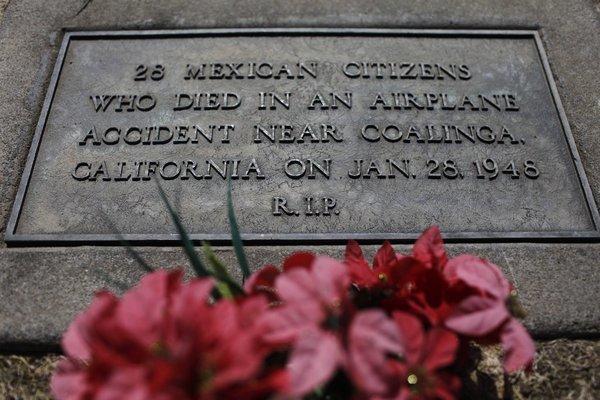On the cold morning of January 28, 1948, a United States Immigration Service plane carrying 28 Mexican citizens, one immigration guard, and three crew members departed from Oakland to transport these agricultural workers to the deportation center in El Centro.
Beginning in 1942, tens of thousands of workers were imported from Mexico to the U.S. as part of the federal Bracero Program to replace the American workforce whose men were away at war. When the harvest seasons ended, workers were deported. American agriculture became so dependent upon this labor that the program continued until 1964.
Tragically, this flight of displaced workers never reached its destination, crashing near Coalinga in the hills of west Fresno County. All souls aboard perished; newspaper accounts identified the two former WWII pilots, the stewardess, and guard, but listed the other passengers only as “deportees.”
Those men and women who had toiled in the fields of lettuce, strawberries, and grapes were further subjected to anonymous indignity as they were buried in a mass grave at Holy Cross Cemetery in Fresno with only a single, small marker identifying them as “28 Mexican citizens who died in an airplane accident.”
The story of the crash gained public attention through Woodie Guthrie’s poem “Plane Wreck at Los Gatos (Deportees)” set to music by Martin Hoffman and first recorded by Pete Seeger.
Goodbye to my Juan, goodbye Rosalita
Adios mis amigos, Jesus and Maria
You won’t have a name when you ride that big airplane
All they will call you will be………deportees
A newly published book, “All They Will Call You”, by Tim Z. Hernandez, recounts the incident and the individual stories of several of those laborers, reestablishing their humanity, which had been lost for so many years. Hernandez, creative writing professor, author, poet, and performer, was also instrumental in raising funds to erect a fitting monument displaying the names of each person who had died, which was dedicated at the burial site in 2013. His book is not only a historical account; it is a reminder to respect the people striving here today.
Stories of immigrants’ hard lives and tragic fate are ongoing. As an adult school ESL teacher in Sonoma, I met hundreds of students who were among the hardest working people I’ve ever known. They picked grapes, tied vines, worked in the wineries and construction sites, cooked and served up food, took care of the elderly, cleaned offices, homes, and yards. Despite feeling lonely for their native countries, they withstood prejudice and hostility with tolerance and maintained good humor about the important things in life: family and friends.
Teaching is much more than books and computers; it’s personal connection, empathy, and encouragement. To see students succeed is the most rewarding experience. To see students die is devastating. Two of my adult school students were killed in work related accidents here. I want you to know their names: Carlos Aceves and Mateo Zarate. I can still picture them sitting in my evening class, trying hard to pronounce unpronounceable English words after working all day. I will never forget them.
It helps to know that others are working to acknowledge the contributions of the immigrant labor force in our area. For the first time, the Napa Valley College history department is offering a class examining the Bracero Program in Napa County. Students will research and conduct interviews to learn about those who established California’s rich agricultural heritage.
With continuing political uncertainty about the future of Mexican immigrants in this country, let us not forget that these men and women are more than a labor commodity without names. They are the backbone of our economy. They are our neighbors. They are our friends.






Excellente como siempre amiga mía
Here’s a good version of Deportee by Los Super Seven
https://www.youtube.com/watch?v=-PvaGJCmr0Y
Loretta, I remember you from my days with La Luz & Vineyard Workers Services and am so happy to find you are today the same bright light for justice & the rights of all to a life of dignity. Thank you for such inspiring words – I can’t wait to read this new book. Is there a chance Mr. Hernandez might visit the Sonoma Valley in the near future?
Hi Deborah, author Tim Z. Hernandez will be at City Lights Bookstore in San Francisco as part of his book tour on Tuesday, Feb. 7, 7 p.m. I think that’s the closest appearance to our area at this time. I hope to entice him to visit the North Bay as his schedule permits. Thanks for your interest and support.